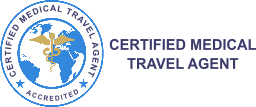As a medical travel facilitator, your reputation is closely tied to the quality of care your clients receive. This makes it essential to carefully select the overseas doctors and hospitals you include in your provider network. Whether you’re just starting out or expanding your business, it’s important to consider a range of factors to ensure that the healthcare facilities you partner with offer safe, reliable, and high-quality services.
Here are some key factors to guide your selection process:
Accreditation by Reputable Organizations
Accreditation is one of the first things you should look for when evaluating an overseas hospital. Hospitals accredited by recognized international organizations, such as the Joint Commission International (JCI), meet global standards for healthcare quality and patient safety. Accreditation ensures that the hospital follows best practices in medical care, facility management, and patient services. Working with accredited hospitals provides reassurance to both you and your clients that the facility has been vetted and is committed to maintaining high standards.
Mortality and Complication Rates
When evaluating a hospital, it’s important to look at their mortality rates for specific procedures. Low mortality rates are a sign that the hospital has experienced and skilled doctors who can successfully manage complex cases. However, mortality rates are not the only measure of quality. Complication rates are just as critical. A hospital with high rates of complications during or after procedures may indicate issues with medical practices, equipment, or the skill level of staff. It’s a good idea to request data on these metrics for the specific procedures your clients are most likely to seek.
Infection Control and Hygiene Standards
Infections acquired in hospitals are a major concern, especially for patients traveling abroad for surgery. To ensure the safety of your clients, review the hospital’s infection control policies and rates of hospital-acquired infections. Hospitals with stringent hygiene protocols and low infection rates are more likely to provide a safe environment for patients, reducing the risk of complications. This is especially important for surgical procedures, where the risk of infection can be life-threatening if not managed properly.
Nurse-to-Patient Ratio
The nurse-to-patient ratio is another important factor to consider. Nurses are often the primary caregivers in a hospital setting, and their ability to provide timely and attentive care directly impacts patient outcomes. A low nurse-to-patient ratio means that each nurse is responsible for fewer patients, allowing them to offer more personalized and comprehensive care. In contrast, hospitals with overworked nursing staff may struggle to maintain the same level of quality, leading to issues such as delayed care or overlooked complications.
Post-Surgical Care and Re-admission Rates
Post-surgical care is an essential part of a patient’s recovery process. You should check the hospital’s re-admission rates to gauge the effectiveness of their post-operative care. High re-admission rates could be a red flag, indicating that patients are not receiving adequate follow-up care or that complications are not being addressed properly after surgery. Hospitals with strong post-surgical care programs will help ensure that your clients recover smoothly, with fewer risks of complications after they return home.
Range of Specialties and Services
Another consideration is the range of specialties and services offered by the hospital. A facility with a wide range of medical services may be better equipped to handle a variety of cases, making it a more versatile option for your clients. This can be particularly useful if you have clients seeking treatment for different types of procedures, such as orthopedic surgery, cosmetic procedures, or specialized treatments like cancer care. Ensure the hospital has specialists who are experienced in the specific procedures your clients are interested in.
Transparency and Communication
Effective communication between you, the hospital, and your clients is crucial for successful medical tourism partnerships. Look for hospitals that offer clear and transparent communication. This includes providing detailed information about costs, potential risks, expected outcomes, and post-treatment follow-up. It’s important that both you and your clients are well-informed throughout the entire process. A hospital that is upfront about its services and pricing helps build trust and allows you to provide your clients with accurate information.
Conclusion
Choosing the right overseas doctors and hospitals is one of the most critical decisions you’ll make as a medical tourism facilitator. By carefully assessing accreditation, patient outcomes, infection rates, staffing, and communication, you can build a strong provider network that prioritizes patient safety and high-quality care. Doing your due diligence not only ensures positive outcomes for your clients but also strengthens your reputation in the medical tourism industry.
Take the time to research and vet each hospital, and always be on the lookout for new information to keep your provider network up to date with the best options for your clients.
Reach Your Full Potential in Medical Tourism with MTB
At MTB, we are dedicated to supporting professionals and organizations in the medical tourism industry as they strive for success. We are a leading provider of certification, contracts, marketing, and support. We offer comprehensive programs, expert guidance, and valuable resources that are designed to help our members achieve their goals and reach their full potential in the global healthcare market. With a focus on excellence and innovation, we help our members stay ahead of the competition and navigate the complex and dynamic world of medical tourism.
Tel/WhatsApp: +1 (561) 909-7178
Email: [email protected]








